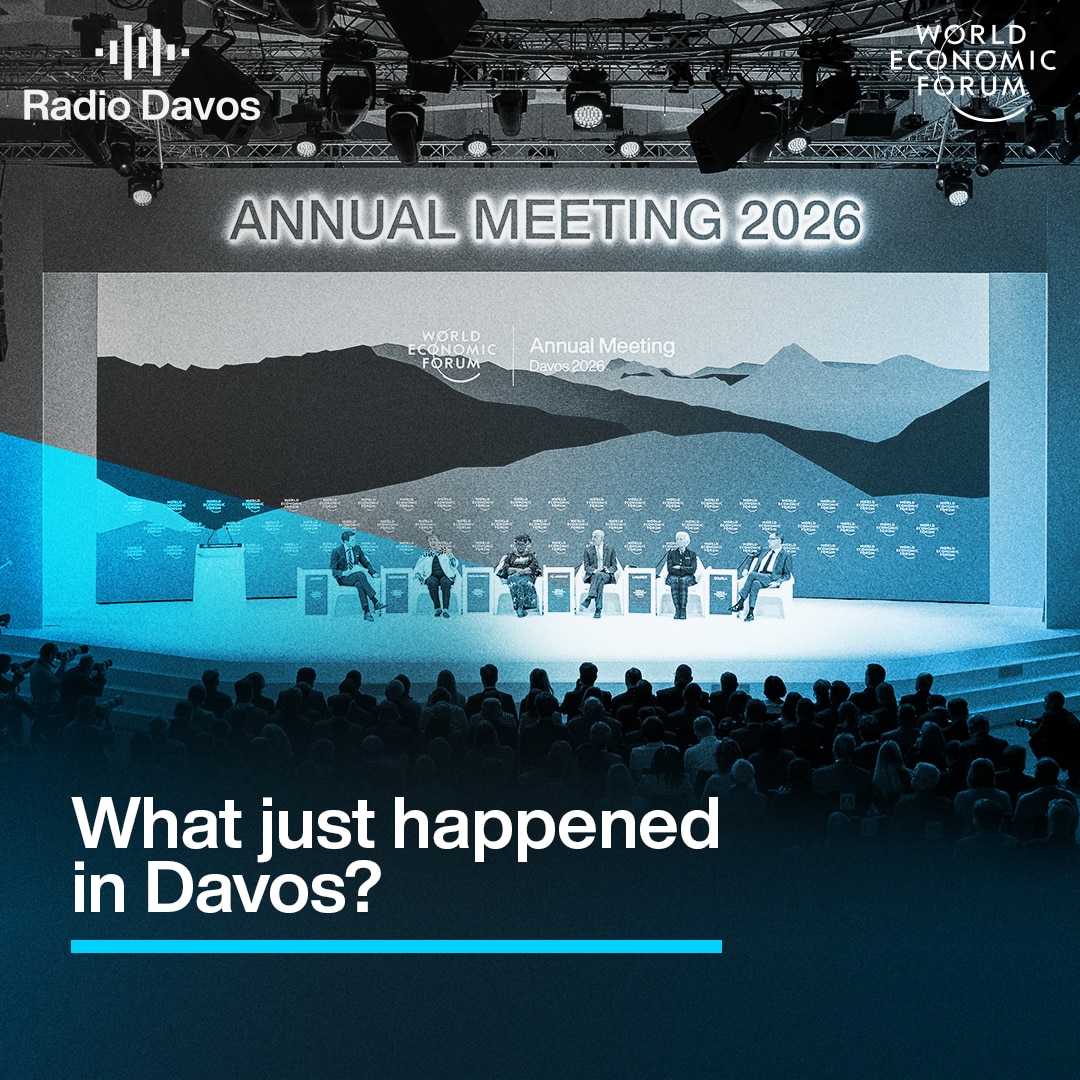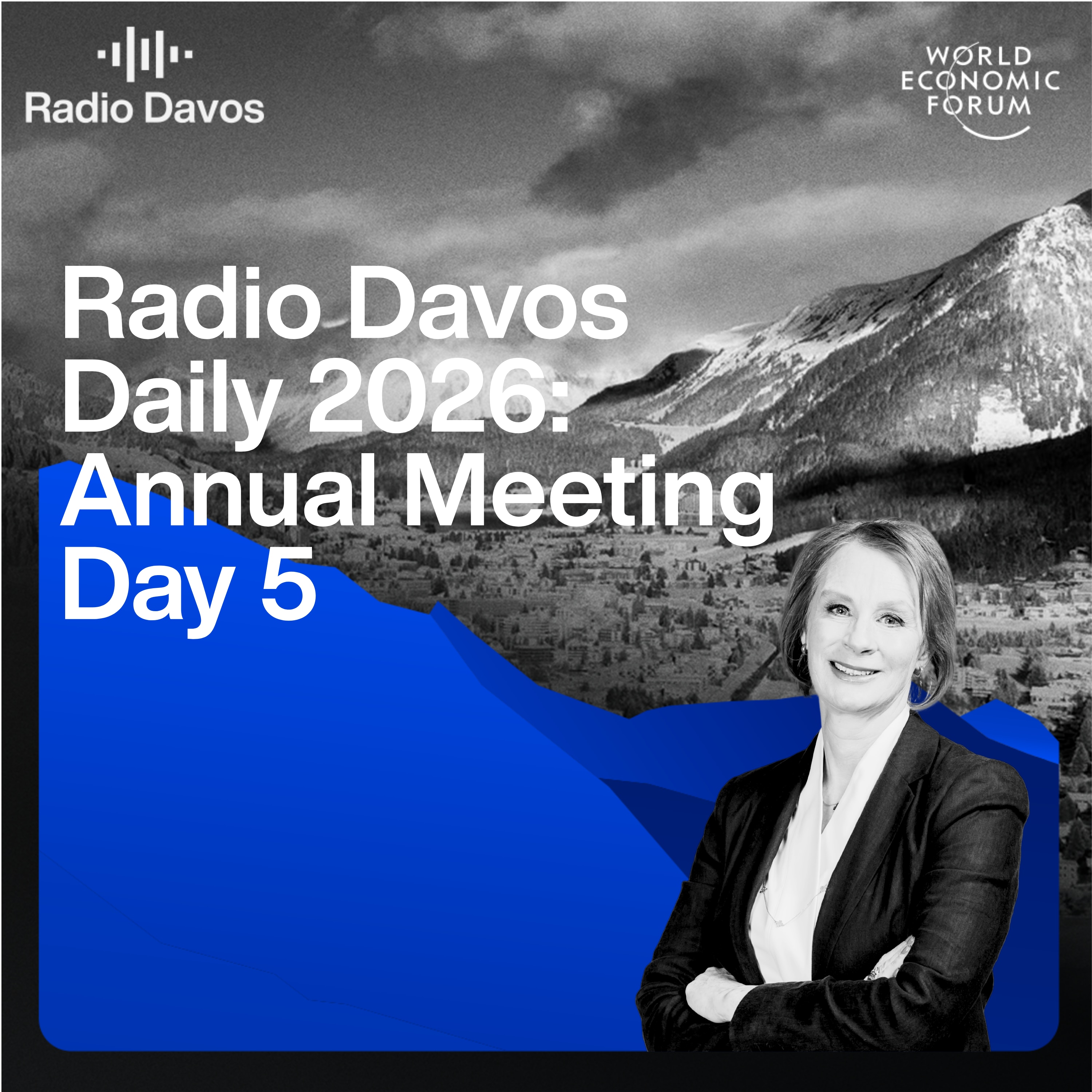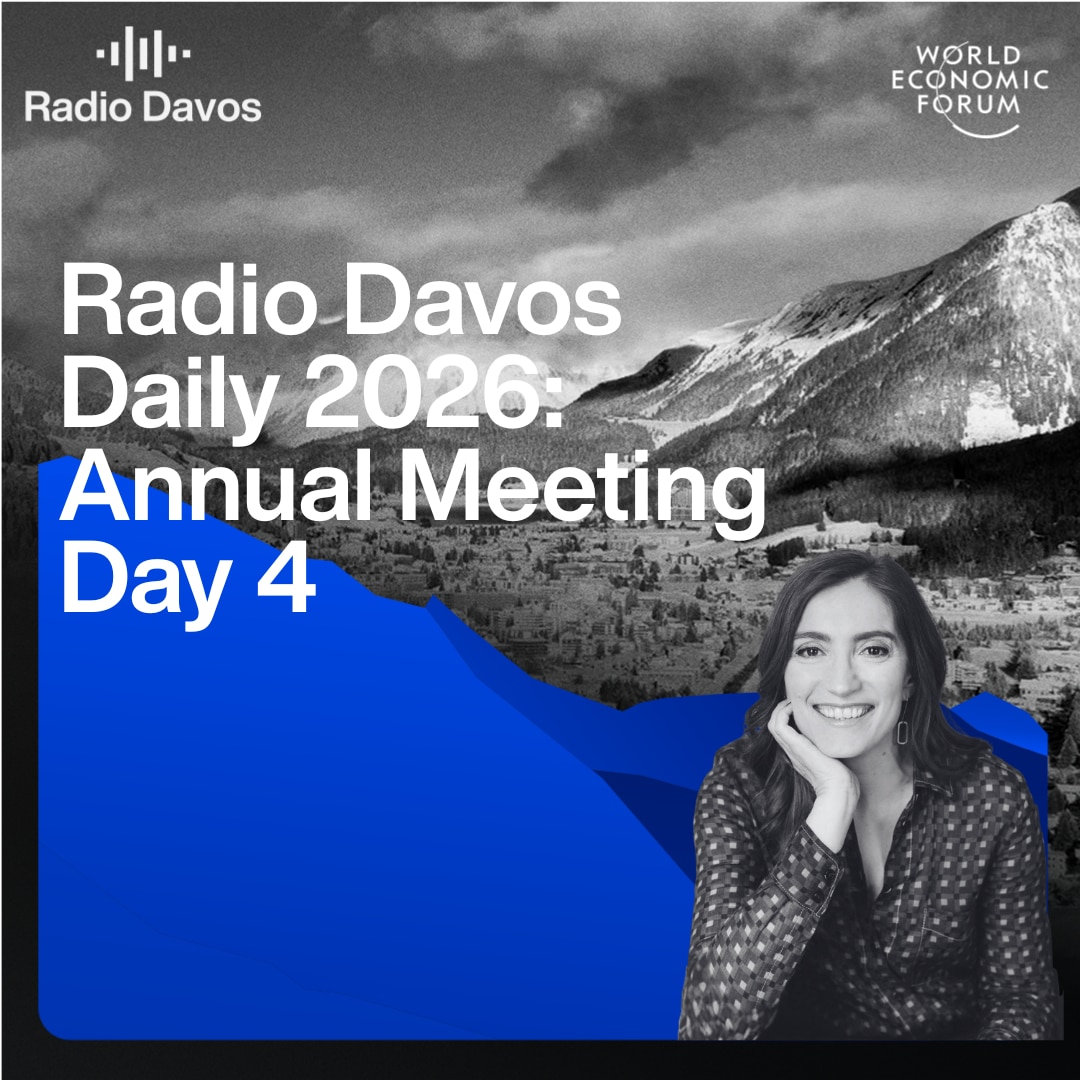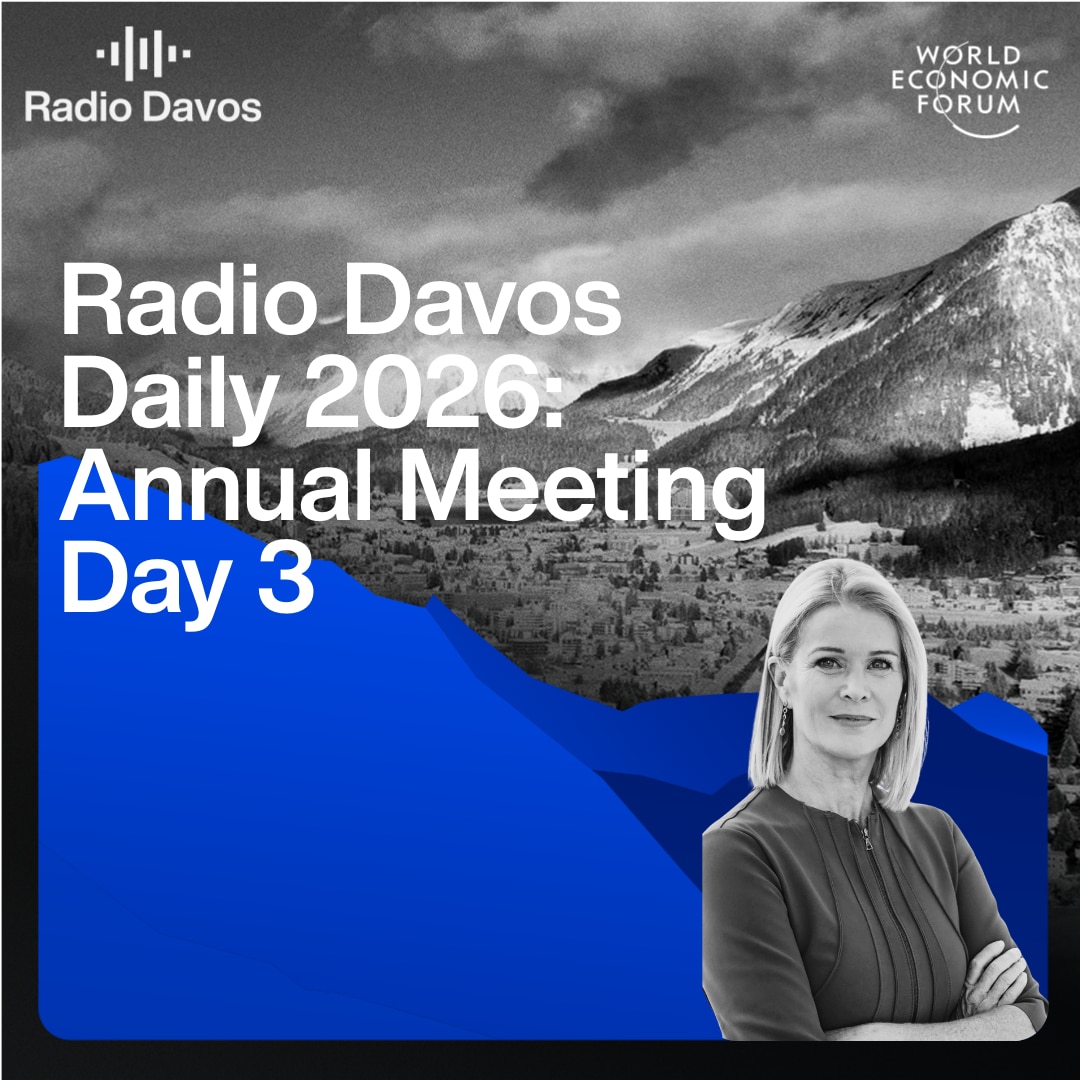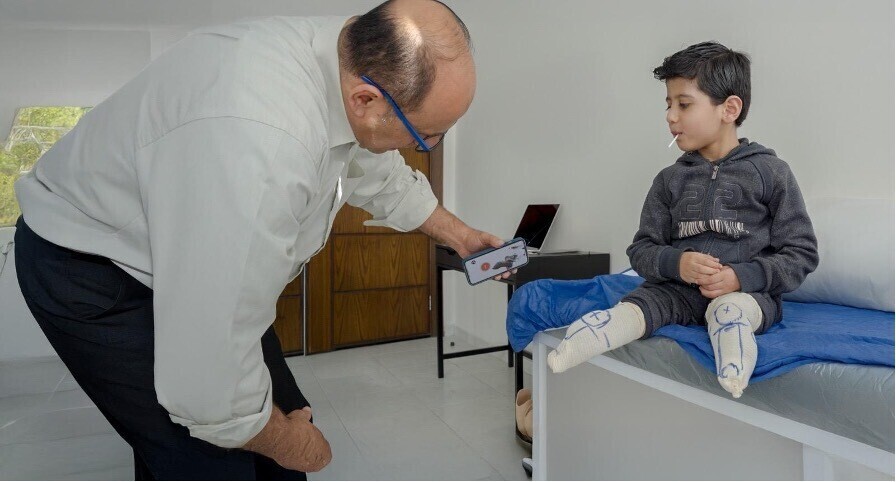Democracy can’t flourish if women are excluded: Nazanin Boniadi on Iran at Davos 2023
ポッドキャスト・トランスクリプト
This transcript has been generated using speech recognition software and may contain errors. Please check its accuracy against the audio.
Nazanin Boniadi, actress and activist: Iran is a country where women gained the right to vote nine years before women in Switzerland.
Robin Pomeroy, host, Radio Davos: Welcome to Radio Davos, the podcast from the World Economic Forum that looks at the biggest challenges and how we might solve them. This week, the women leading calls for change in Iran and around the world.
Arancha González, Dean, The Paris School of International Affairs (PSIA), Sciences Po: We love democracies and we talk a lot about how to make democracies work better, and they will not work better if half of the participants in those democracies are not included.
Robin Pomeroy: On this episode, I speak to actress and activist Nazanin Boniadi, who was at the World Economic Forum's annual meeting in Davos to talk about the protest movement in her native Iran being led by women, a movement she says has global resonance.
Nazanin Boniadi: When you look at the slogan 'Woman, Life, Freedom', of course it means advocating for women, a better life and for freedom. And that applies to people everywhere.
Robin Pomeroy: With women's rights under increasing threat in several parts of the world. Nazanin Boniadi says society can only flourish if women can flourish.
Nazanin Boniadi: We understand that if women don't have their rights, that usually leads to society at large being deprived of their basic human rights.
Robin Pomeroy: Boniadi says a protest movement led by women is more likely to result in a democratic outcome the one led by men.
Nazanin Boniadi: Every time we've seen women participate, have central participation in a movement, as we did in Argentina, as we did in Chile, for example, there's a greater likelihood of democracy prevailing.
Robin Pomeroy: Listen back to our daily podcasts from Davos 2023 by subscribing to Radio Davos wherever you get your podcasts, or visit wef.ch/podcasts. And don’t miss our sister podcasts, Agenda Dialogues, which carries the full audio of some of the best sessions from Davos, and Meet the Leader, which spoke to some of the most influential figures at the Meeting.
Catch up on all the action at Davos 2023 at wef.ch/wef23 and across social media, using the hashtag #WEF23.
I’m Robin Pomeroy at the World Economic Forum, and with this look women, Iran and democracy
Nazanin Boniadi: That's why politically active women are such a threat to autocrats.
Robin Pomeroy: This is Radio Davos.
Arancha González: We love democracies and we talk a lot about how to make democracies work better, and they will not work better if half of the participants in those democracies are not included.
Robin Pomeroy: Former Spanish foreign Minister Arancha Gonzalez, speaking in Davos at a session called Women's Leadership Towards Parity in Power.
Arancha González: We just went through a massive health crisis. Where were the women? They were nurses. They were doctors. They were workers at the base of the pyramids. And they saved us, by the way. Wherever the women the women are in the education sector, where are the women? The women are in science. Because what matters is using your brains. And women have plenty of brains to use. But where are they not? They are not in positions of power. And by the way, power, it's very hostile to women.
Robin Pomeroy: Arancha Gonzalez, now dean of the Paris School of International Affairs at the French University Science Po, speaking on that panel, which you can hear in full on our sister podcast, Agenda Dialogues.
The position of women in a man's world came up at another session in Davos 2023, the World Economic Forum's annual meeting that happened in mid-January. That panel was called Women's Rights in Iran. What next? One of the speakers was the actress Nazanin Boniadi, currently appearing on the Amazon prime TV show The Lord of the Rings: The Rings of Power, and ahead of the session. She popped into the Radio Davos booth at the heart of the Congress Centre to talk about her activism. We played a clip from it on one of our daily podcast from Davos. Go back and check those out. But here's the interview in full, which happened early on in the Davos week.
Robin Pomeroy: Well, we're in Davos, and I'm welcoming to the Radio Davos booth Nazanin Boniadi, actor and activist. Nazanin, how are you?
Nazanin Boniadi: I'm well. Thanks for having me.
Robin Pomeroy: Have you had enough time in Davos to get an impression of the place of the event, or have you just rushed straight in?
Nazanin Boniadi: I came to you. I got here last night and I literally just came from the registration booth and testing. So this is my first foray into anything Davos.
Robin Pomeroy: But you have experience in the United Nations as well with your activism, is that right?
Nazanin Boniadi: Yes. I was recently at the UN Security Council, where I spoke at the formula meeting convened by the United States and Albania on Iran. And I spoke there.
Robin Pomeroy: You were born in Iran. You're Iranian.
Nazanin Boniadi: Yes.
Robin Pomeroy: But grew up, from what kind of age were you, in London?
Nazanin Boniadi: So I was born in May '79, and my mother was 19 when she had me. And while she was still pregnant with me, she was one of the anti-revolution protesters. So she and my father were very much opposed to any kind of Islamic republic or theocratic rule or Khomeini coming into power. They saw the backsliding of rights and they realised that they couldn't have a child in a social, legal, political climate that was growing increasingly oppressive, particularly towards women and girls.
So my mother, I always say my first protest was in the womb. I was in my mother's womb when she was 19, and she is what they call a shirzan, or a lioness. And that that that word is being used a lot more these days because we're seeing women on the front lines.
Women have been on the front line since '79 standing up against compulsory hijab. It's just this moment that we're seeing that's getting more media coverage and that they're coming out on force, really.
But I want to say that that's where my passion for human rights and particularly women's rights in Iran came from, from my parents, and essentially being in my mother's womb when she was fighting against the oppression.
Robin Pomeroy: 1979, I mean, it's a year absolutely engraved into history for Iran. But, something that just had repercussions around the world and we're still feeling them today. What you, you know, I don't want to sound like an expert on it, but I was a Reuters correspondent in Iran, So I've read a few books and I've lived in Iran for two years. There were opponents to the Shah. Many of them weren't Islamists, so they wouldn't have been supporters of Khomeini. But people coalesced around that, and some of the Islamic laws, particularly the compulsory hijab, was not supported by a lot of people who were in favour of big, deep political change at the time. But I think at the time a lot of people said 'that's not a big deal'. And the hijab, even if you go to Tehran today, it's a headscarf over the hair. It's not a burka. But even back then, and very much today, people, women in Iran are saying, no, this is a big deal.
Nazanin Boniadi: It is a big deal. And I think, you know, people, some people make the mistake of saying this is, the protests are anti compulsory hijab, anti morality police. Sure they are. But what perhaps people may not understand is that the hijab, the compulsory hijab, has become a symbol. It's just a symbol, outward symbol, of the overall oppression that women face in Iran.
And, you know, whereas in '79, you had all these different opposition groups that were sort of co-opted by Khomeini. And and then he came into power, he sidelined everybody.
Now you have everyone united, understanding. There's a lot of nostalgia for pre '79 Iran. And we're seeing those slogans even in the protests on the streets of, you know, 'long live Reza Shah'. And you know, and it's such a stark difference to what you saw in '79. And now what we're seeing is women on the front lines. Their participation really is central to these protests, but what they've managed to do is they've galvanised Iranian society at large to understand the intersectionality of gender equality and then most every other basic human right.
So and because Mahsa Amini was not only a woman that sparked this, but an ethnic minority, a Kurdish woman. And if you look at everything from the Arab Spring to more current revolutions in the region, you'll see that men. young men, have died and sparked revolutions. This is a woman who's died and sparked this revolution. And now it's come to this this point where it's become a pro-democracy movement.
Robin Pomeroy: Let's remind listeners who Mahsa Amini was. Could you tell us what happened there, for people who don't know?
Nazanin Boniadi: Yes, of course, Mahsa Amini was a 22-year-old Kurdish Iranian woman who was visiting Tehran with her brother, got arrested by the morality police or so-called morality police for inappropriate hijab. She was thrown into a van.
Robin Pomeroy: Inappropriate hijab, let's just remind listeners, means her hair wasn't properly covered. That would be the accusation. Which in Tehran is very, very common. But every now and then, the morality police come out. At least at the time I was living there - never bothered me - the men - don't seem to be any restrictions on them - but the morality police come out and can just pick women up walking on the street who look, they're wearing a headscarf even, but there's hair coming out of it, and bundle them off into the minibus or the police van.
Nazanin Boniadi: That's exactly right. And so she was thrown into this minibus with other women who'd been arrested. And three days later, she goes into a coma and she dies three days later, essentially. And that was, I think, September 16th that she died. Her medical records were withheld from her family. She had no pre-existing health conditions, according to her family. As I said, she was 22, young. Her brother saw that she was violently thrown into the van. There are eyewitnesses inside the van who've reported that she was beaten in the van. And so everything points to the fact that she was murdered, she was killed by the morality police.
And since then, we've seen this uprising. And yes, it started with women, young girls, schoolgirls essentially, coming out, taking off their hijab, waving it, not only waving them as they've done in the past few years, but setting them ablaze, cutting their hair in protest, dancing in the streets. And then you saw - and this is despite the great risk of being beaten, raped, blinded, imprisoned and even killed.
And so since then, more than 500, over the course of the past, more than four months, more than 500 protesters have been killed, more than 19,000 protesters with average age of 17, a month into the protests IranWire reported that the average age, according to the government, Iranian government, of people arrested in protest was 17.
So it's very much youth-led. And four protesters have since been executed - sentenced to death and executed, of which three were in their early twenties. And there is a very strong middle class component, it's very broad based. And so what started as this women's rights uprising has really been galvanised into a pro-democracy movement and now people are chanting 'Death to Khamenei' and they don't want an Islamic republic.
Robin Pomeroy: Do you think it's different this time? You mentioned the the Arab Spring. Of course, Iran's not an Arab country, but it's next door. And around the same time there was, in fact, before the Arab Spring, I think was the the 'green movement' in Iran and around the world people were seeing that and thinking, well, is this an uprising of the youth? And again, protesters were reportedly killed. It didn't really change very much in the long run. Do you think it's different this time?
Nazanin Boniadi: I think it's different on many levels. First of all, it is centred on female participation and that, you know, scholars have said that the involvement of women is more likely to lead to a positive outcome in democratic movements. And we've seen that and in Chile, Argentina, Brazil. And so there's hope there. There's also, if you look at the international response to it, it's unprecedented what we're seeing. First of all, it's been non-stop protests for more than four months now. I myself was invited. I met with the U.S. administration early on in the protests.
Robin Pomeroy: You met the vice president.
Nazanin Boniadi: Vice President Kamala Harris. I met the secretary of state and I met the national security adviser, Jake Sullivan. And and they did take positive steps. You know, I was invited to speak at the U.N. Security Council Arria-Formula meeting that was convened by the U.S. and Albania shortly after that, which was unprecedented. And after that, we had the U.N. Human Rights Council and the positive outcome there for a fact finding mission on the protests, again, unprecedented. We've had the Islamic Republic expelled from the Commission on the Status of Women at the United Nations. Again, unprecedented. There's no precedent for that.
People said it couldn't be done. It was done. And the reason is because people are outraged. For the first time. It really struck a chord with the global community in a similar way that the anti-apartheid movement in South Africa did, I think. And as long as the people in Iran, the brave protesters in Iran, continue on this path, I can't see any other outcome other than democratisation because I think we are now, the international community, is now paying attention.
Robin Pomeroy: You're an actor and an activist. Which came first?
Nazanin Boniadi: Well, I want to say activism was always in my blood. Acting came to me my mid-twenties. It's just that I got to use my platform as an actress to to be a more effective advocate.
But I can tell you, my my activism started shortly before the 2009 protests, the Green Movement. And I all I'd done was a soap opera in America. So I had virtually no acting platform.
And I remember my early days, I would picket outside, with five of my friends, just picket outside news outlets, try to get media coverage. Of course, we failed, but I kept going and persisting. But really, the moment now, this moment, is different, not only because, of course, I have a bigger acting platform, but I think it's because of the courage that the Iranian people are showing that the doors are open for so many of us in the diaspora to be able to take these meetings with lawmakers and with journalists and do interviews, because people want to know what's happening in Iran. So it's really they're opening the doors for us to be able to to amplify their voices.
Robin Pomeroy: So you have a bigger platform than you did when you were young actress in an American soap opera. I just read this about your character in The Lord of the Rings: The Rings of Power. Bronwyn is described on this website as 'she has no special powers, no superhuman fighting skills, nor a millennia-spanning life expectancy. But Nazanin Boniadi's The Lord of the Rings, the Rings of Power character, Bronwyn, is an inspiring woman of great inner strength'. Would that be a fair description of you as well?
Nazanin Boniadi: Oh, goodness. Well, I mean, I drew a lot of inspiration for that role... In fact I dedicated that role to the brave women of Iran. So if anything, I think I modelled her after them.
And what's surreal to me and very bitterly ironic is that two months before this, I'm sitting in Comic-Con, in America, in San Diego, promoting this show two months before Mahsa Amini was killed. And I'd dedicated Bronwyn to the brave women of Iran who are at the forefront of the fight for democracy and freedom.
And then shortly after that Mahsa was killed, just two months later, and I found myself outside the Federal Building in Los Angeles, speaking to 20,000 protesters, Iranians who had gathered to protest the brutalities against Mahsa and protesters in Iran. So this moment, I think there's a there's a there's a odd synergy between Bronwyn and what's happening right now in Iran.
Robin Pomeroy: So it's your first time in a Davos World Economic Forum Annual Meeting. You will be speaking on a panel called Women Rights in Iran. What next? I just want to ask you, what is next? Either answer that question or what do you hope will be said and will be the outcome of that panel?
Nazanin Boniadi: I mean, my hope is: we are at the World Economic Forum. So, you know, to tie this in to what we can do, the Iranian diaspora, and it's I think it's somewhere between 4 to 7 million globally, apparently has, I recently read that it is worth $2.5 trillion. That's more than the GDP of Canada and Australia. So we have a great deal of potential outside of Iran to be able to change Iran not only politically but economically.
My hope is that we can tap into that huge resource and find a way forward, of influencing lawmakers wherever we may be. But not only that, giving internet access to the people of Iran so that they can overcome these internet shutdowns, that the regime is so known for, the blackouts.
Robin Pomeroy: When I was living in Tehran, you would know when there were political problems, whatever, because the internet would slow right down. You'd go on it and you'd say, oh, okay, something's happening here. And then it would speed up again. And then sometimes they shut it down completely.
Nazanin Boniadi: And to put it in context, I'm in Switzerland so it's appropriate to say that Iran is a country where women gained the right to vote nine years before women in Switzerland. And we once had regionally revered female pop singers and a national ballet. And what you're seeing now, in the past 44 years, is this reversal of rights, but not only a reversal, but like setting it back hundreds of years. Just being here and doing that comparison is quite jarring to me.
Robin Pomeroy: So the name of the panel is Women's Rights in Iran. What next? So what next. do you think?
Nazanin Boniadi: Well, what next? Hopefully, democracy, representative government. That's what when I speak to dissidents on the ground in Iran, families of those are imprisoned, activists, women's rights activists, these calls for everything that we're doing now, the expulsion of the Islamic Republic from the Commission on the Status of Women at the U.N., the fact finding mission, and everything after that. Today in Strasbourg, thousands of Iranians gathering to call on the IRGC to be put on the terror list.
Robin Pomeroy: That's the Revolutionary Guards.
Nazanin Boniadi: Yes, the Islamic Revolutionary Guard Corps, which, by the way, there's no mention of the word Iran in the name. It's the Islamic Revolutionary Guard Corps, because they're tasked with protecting the Islamic revolution, not the Iranian people.
And, you know, to me, that's something, that's a call that's coming from inside Iran. The number of prominent dissidents that I'm talking to inside the country. I always go back and I consult with them and I say, is this something you would like us to do? And if the answer is a resounding yes, then we move forward. And we are more organised outside, the diaspora community is more organised outside than we've ever been.
So my hope is, yes, the IRGC is proscribed as a terrorist organisation, that we sanction the Supreme Leader, which we haven't done yet, that we find ways to improve internet access inside Iran, that we find ways not to harbour and provide safe havens to prevent regime officials and their families who are living in freedom outside the country, unless they have cut ties with the regime and denounced the regime, and instead provide safe haven to dissidents who need that, people like Roya Piraei whose mother was killed by the regime, and needs a safe haven.
So we have to be unequivocal, are we still supporting the people of Iran, or are we still appeasing the Islamic Republic? My hope is that it's the former, and I think we just have to be very clear in our policies.
Robin Pomeroy: The slogan 'Life, Woman, Freedom', does that have resonance around the world, do you think? I mean, this Iranian diaspora, but also, are the women of Iran also making a stand for women and a better society around the world.
Nazanin Boniadi: I think when you look at the slogan 'Woman, Life, Freedom', of course it means advocating for women, a better life, and for freedom. And that applies to people everywhere. And I think what struck a chord on an international level in a similar way that the anti-apartheid movement did in South Africa, is we understand that if women don't have their rights, that usually leads to society at large being deprived of that basic human rights. And that's why women, politically active women, are such a threat to autocrats and authoritarians. And every time we've seen women participate, have central participation in a movement, as we did in Argentina, as we did in Chile, for example, there's a greater likelihood of democracy prevailing.
So they're really standing, not only are they standing up for themselves, but they're standing up for women everywhere. And at a time where bodily autonomy is such a hot topic in America, at a time where racial divides exist elsewhere, and, of course, we see women in Afghanistan fighting for their most basic fundamental rights to education and other rights. This topic is - it really belongs to all of us.
Robin Pomeroy: You can watch Nazanin Boniadi speaking on that panel discussion, Women’s rights in Iran – what next? On our website, wef.ch/wef23 and you can find all our podcasts including the daily Radio Davos shows, at wef.ch/podcasts.
Please subscribe to Radio Davos wherever you get your podcasts and please leave us a rating or review. And join the conversation on the World Economic Forum Podcast club -- look for that on Facebook.
This episode of Radio Davos was written and presented by me Robin Pomeroy. Studio engineering was by Juan Toran, editing by Taz Kelleher and audio production by Gareth Nolan.
We will be back next week, but for now thanks to you for listening and goodbye.
Actress and activist Nazanin Boniadi, who was at the WEF’s Annual Meeting in Davos to talk about the protest movement being led by women in her native Iran, joins us on Radio Davos to discuss the situation.
And we hear from former Spanish foreign minister Arancha González, who tells a panel discussion at Davos 2023 that “power is very hostile to women”.
Davos 2023 sessions related to this podcast:
Women’s Leadership: Towards Parity in Power - hear the podcast: Davos 2023: Women’s Leadership: Towards Parity in Power
Read more:
Subscribe:
Subscribe on any platform: https://pod.link/1504682164
Join the World Economic Forum Podcast Club
Follow all the action from the World Economic Forum’s Annual Meeting 2023 at wef.ch/wef23 and across social media using the hashtag #WEF23.
Check out all our podcasts on wef.ch/podcasts:
Related podcasts:
トピック:
公正、多様性、包摂性その他のエピソード:
「フォーラム・ストーリー」ニュースレター ウィークリー
世界の課題を読み解くインサイトと分析を、毎週配信。
